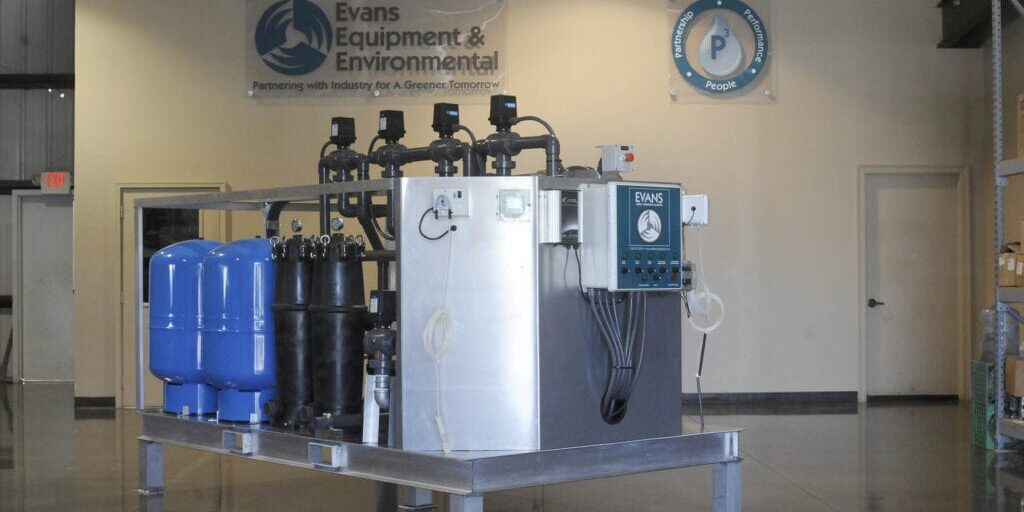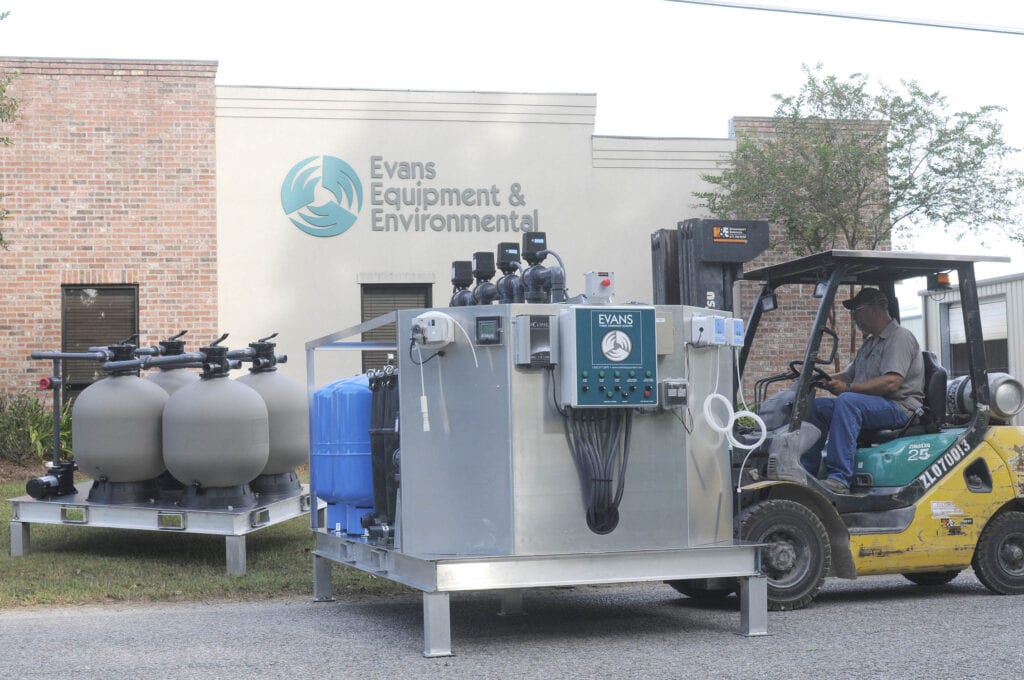Solutions
Locations
STAY CONNECTED
Signup for our blog to receive tips and knowledge on industrial wash and wash water treatment best practices.
WORK WITH US
Don’t settle for less than a solution from a partner who takes complete responsibility from start to finish. We make it easy to keep things clean and compliance effortless. Contact us today to discuss your wash water recycling and industrial wash needs.

The Evans Mechanical Filtration System (EMF) is engineered to remove tough contaminants from industrial wash water — including clays, silts, flocs, oils, and grease.
Using layered filtration media such as sand, carbon, and optional clay, the EMF mechanically separates suspended solids to produce clear, compliant water.
Constructed from marine-grade aluminum or durable poly, it’s built for long-term performance and can operate as a standalone unit or integrate seamlessly with Evans’ complete line of wash water treatment systems.
How It Works
Each Evans Mechanical Filtration System is configured based on the micron level and contaminant profile of your wash water. Standard systems typically include multi-media filters that layer sand, gravel, and anthracite to capture suspended solids.
Depending on your water quality goals, additional media, such as carbon or clay layers, can be integrated for finer filtration or specific contaminant removal. Some configurations also incorporate sock (cloth) filters, which provide an extra stage of mechanical separation for high-solids or high-flow applications.
The EMF mechanically filters contaminants through a series of stages, each designed to target specific particle types and sizes:
- Initial Surface Filtration: Wash water enters the system, where the largest particles and debris are screened out.
- Progressive Depth Filtration: Water then passes through multiple layers of sand, carbon, and other filter media to capture smaller suspended solids, oils, and grease.
- Water Reclaim System & Discharge: The filtered water either continues on through bioremediation in a water recycling system for reuse in a closed-loop system or exits the system, ready for compliant discharge.
For operations managing both organic and solid contamination, the EMF can be paired with the Evans Bio System (EBS) or Oil Water Separator for advanced wash water recycling treatment.
Specifications & Key Features
- Marine-grade aluminum or poly construction for strength, corrosion resistance, and longevity
- Easy installation — self-contained and skid-mounted with forklift pockets
- Rapid degradation of oil, grease, diesel, and hydrocarbons
- Compact footprint with a modular design for mobile or fixed-site use, easily integrated with other Evans wastewater recycling systems
- Equipped with safety features and control systems for dependable operation
- Customizable flow rates and configurations to fit site-specific demands
Ideal use: From clay to crude, the EMF keeps your wash water clean and compliant.
- Heavy Equipment Wash Bays
- Construction & Rental Yards
- Oil & Gas Sites
- Transportation & Fleet Maintenance
- Power Generation Facilities
- Municipal and Government Operations
Compatibility & Systems Integration
Create a comprehensive treatment setup with Evans’ modular water systems:
- Oil Separator – remove heavy oils and solids before filtration
- Evans Bio System (EBS) – biodegrade organic contaminants after filtration
- Portable Wash Rack – Engineer a setup that saves time, cost, and headache.
Together, these systems deliver a complete wash water treatment solution that’s effective, compliant, and built for long-term performance.
1. What contaminants does the Evans Mechanical Filtration System remove?
The EMF is designed to remove solids and emulsified materials such as clay, silt, floc, oil, grease, and mud.
2. How does it differ from the Evans Bio System (EBS)?
The EMF is a mechanical treatment method focused on physical filtration, while the EBS uses biological processes to break down organic matter. They can work together for comprehensive, advanced wash water treatment.
3. Can the filtered water be reused?
Yes. Once filtered, wash water can be recycled for use in industrial pressure washing or routed to additional Evans treatment systems for further purification, as needed.
4. What safety and control features come with the EMF?
The Evans Mechanical Filtration System is equipped with multiple safety and control mechanisms to protect your equipment and water quality. These include:
- Flow and level monitoring: High and low-level floats help maintain proper circulation.
- Automatic shutoff: Stops the system if levels reach critical points.
- Electrical protection: Circuit breakers safeguard against power issues.
- Overflow management: Excess water is diverted safely to a secondary location, preventing spills or system damage
5. What maintenance does the system require?
Routine scheduled maintenance by Evans technicians and weekly maintenance by your onsite crews, including media inspection, filter cleaning, and control checks, will keep the EMF running efficiently. Learn more about Evans’ nationwide maintenance programs.
6. Does the EMF meet discharge and environmental standards?
Yes. The EMF is designed to help your operation meet EPA, state water quality requirements for treated wastewater.
7. Can you customize the filtration media layers?
Yes. Evans specialists can customize media blends and system design to meet your site’s exact discharge or recycling requirements. It depends on what micron level the water must reach. Some may use a vertical sock filter or multi media filters alone, and some may need a combination.
8. What determines whether the EMF is built with marine-grade aluminum or poly?
It depends on the system design and application. Skids and oil separators are typically built from marine-grade aluminum for strength and corrosion resistance in fixed or outdoor installations. Poly materials are used for multi-media filter tanks, pre-filter storage, or mobile configurations, where lightweight and chemical-resistant construction is beneficial. Sock (cloth) filters use carbon housings for added durability.

